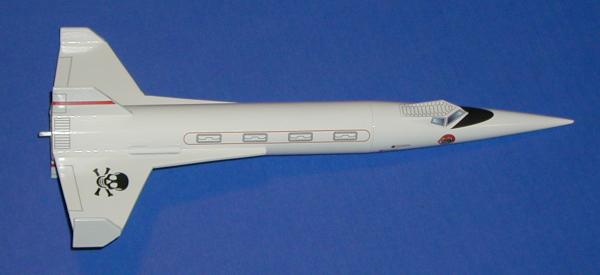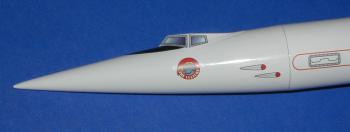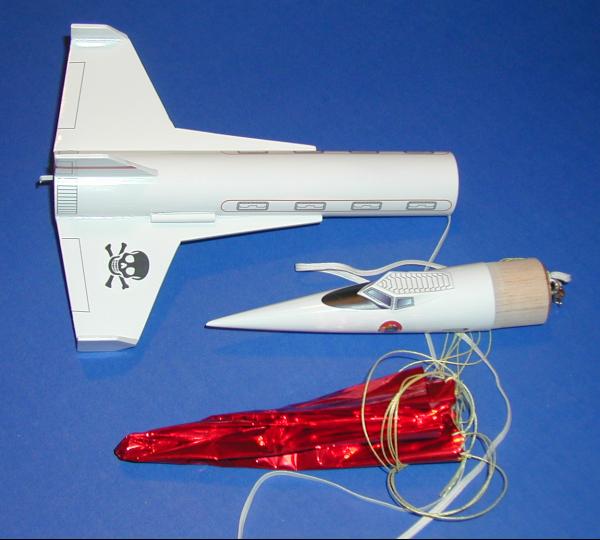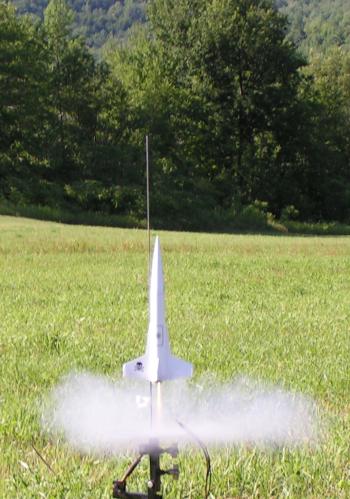| Published: | 2010-11-13 |
| Diameter: | 1.33 inches |
| Length: | 13.40 inches |
| Manufacturer: | Squirrel Works  |
| Skill Level: | 2 |
| Style: | Futuristic/Exotic |
(08/31/05) I have been eyeing them for a while, but I have finally gotten around to buying a couple Squirrel Works kits. This one, Vulture, and the Astrid. Squirrel Works has some exceptionally nice looking graphics associated with their kits that make them jump out at ya and say, "buy me". Most have a sci-fi theme associated with them. So as Squirrel Works states about the Vulture: "Get ready to explore the cosmos with this precisely detailed space plane".

The kit is packaged professionally and includes an 8" long, 1.325" diameter body tube, and a 5.5" long balsa nose cone. The fins are laser-cut balsa. There is a cardstock cockpit, a motor tube with black fiber centering rings, thrust ring, and a motor hook. A washer is provided as nose weight. There is an eye-screw to attached the 36" long, 1/8" wide elastic shockcord to and a 12" mylar parachute. A decal sheet is provide to complete the make up of the kit.
CONSTRUCTION:
The instructions are printed on a multi-folded sheet of pager. They include illustrations for construction and pictures for kit contents and decal placement. The tube marking guide and 3-fold paper for the attachment of the shockcord are cut out from the instruction sheet. Instructions are logical and easy to follow.
The Vulture is a fairly easy kit. With the wing tips and the cockpit, it would probably fall into a skill level 3 (from Estes and Quest standards).
The assembly of this progresses as one would expect:
The motor tube is assembled. You will need a strip of masking tape to hold the center of the motor hook to the body tube. The two centering rings are added along with a thrust ring.
The next step is to mark the body tube. The marking guide aligned well.
The fins are then attached. The main wing is made up of two pieces of balsa (laser-cut is wonderful). These two pieces, called the wing and fairing, give the Vulture a nice look. But what tops off the look, is the two perpendicular wing tips that are glued onto the end of wing-fin. There are two other stabilizing fins that are on the top and bottom of the rocket body.
The nose cone is really grainy to me, so I would recommend sealing and sanding it before you use it in the build. This is important because once the cockpit is put in place, it makes the nose cone harder to smooth out and finish (I know).
The cockpit is made from cardstock. It is cut out, folded, glued and then glued onto the nose cone. I consider this a nice touch.
Squirrel Works goes on to give instructions on assembly of the parachute and attachment to the nose cone (via an eye-screw) and the body (via 3-fold paper method). The parachute is 8-sided mylar and uses Kevlar® shroud lines. The shroud line ends were frayed to about 1".
They also give basic finishing instructions and then detailed instructions on placement of the provide water-transfer decals.
 Have I expressed how much I enjoy working with balsa
nose cones?... NOT. But, they are sometimes a necessary evil due to small
manufacturers' ability to produce plastic ones, or cost, or those holding on to
the "old" ways, or those that are more environmentally conscious, or,
or, etc. Well, let me tell you about the Vulture's nose cone: it ranks in the
top of the necessary "evil" class! I believe it is because of
the sharp angle cut on the balsa that really opened up the grains. Perhaps the
grade of balsa, but regardless, the grains were really exposed.
Have I expressed how much I enjoy working with balsa
nose cones?... NOT. But, they are sometimes a necessary evil due to small
manufacturers' ability to produce plastic ones, or cost, or those holding on to
the "old" ways, or those that are more environmentally conscious, or,
or, etc. Well, let me tell you about the Vulture's nose cone: it ranks in the
top of the necessary "evil" class! I believe it is because of
the sharp angle cut on the balsa that really opened up the grains. Perhaps the
grade of balsa, but regardless, the grains were really exposed.
I have yet to develop a better method for finishing balsa and perhaps after this I will. Please note that I don't use sanding sealer so some of my frustrations could be self-induced. I stuck to my typical multiple coats of Plastic-Kote Primer and sanding in-between. With the exposes grains, it took no less than 10 coats of primer with sanding in-between to get a nice smooth finish on this nose cone... but it looks good now, doesn't it!
The rest of the primer, sand, primer, sand technique was normal. I then painted it with my favorite low-cost painting solution: Walmart paint (additional comments about Walmart paint).

I only had to paint it one color, gloss white, so I then applied the wonderful set of decals the next day. I love the decals provided by Squirrel Works. They are water-transfer and went on like a dream. They were not too thin and adhered well. If I really want to complain, I would suggest that Squirrel Works adds a decal for the outside of each wing-tip fin. Had I given it a forethought I would have put the little Vulture circle out there instead of under the cockpit.
After 1 week, I hit the whole rocket with a coat of Walmart Clearcoat to seal the decals.
No fault of Squirrel Works, but I made a mistake in finishing the rocket... can you find it?

Overall, for CONSTRUCTION I would rate this kit 4 ½ points. The instructions are excellent. The part components are excellent. The decals are excellent. The balsa nose cone was a pain.
 FLIGHT/RECOVERY:
FLIGHT/RECOVERY:
Squirrel Works recommends the A8-3, B4-4, B6-4, and C6-5.
Squirrel Works indicates the finished rocket should weigh 1.5 ounces. My finished rocket weighed 2.0 ounces.
I have only flown my Vulture once and I've been waiting and waiting to get at least 1 more flight. It appears that this will be my lowest number of flights/year since getting back into the hobby, so, I'm going forward with the review and posting it... with one flight.
First flight was on a Quest A6-4. The flight was excellent and very stable. Ejection was at apogee and the rocket descended with no issues.
So there ya have it. Perfect flight.
For FLIGHT/RECOVERY, I would rate this rocket 5 points. Again, based on 1 flight so far, but the components are nice and there is good consideration to the length of shockcord. It was stable as built per the instructions.
I give the rocket an OVERALL rating of 4 ½ points. Nice looking rocket, that requires a bit of work to look polished with the balsa nose cone. Small and unique.
Other Reviews
- Squirrel Works Vulture By James Gartrell
Brief: The Vulture is a BT-55 kit that flies on an 18mm motor with parachute recovery. The kit art is the usual high quality graphic that is a signature of Squirrel Works kits. The same goes with the parts quality, which is excellent too. Flights are really spectacular. The rocket is very fast and stable and looks great on the pad. Construction: The parts list: 1 BT-55 ...
 |
 |
Flights
Sponsored Ads
 |
 |











